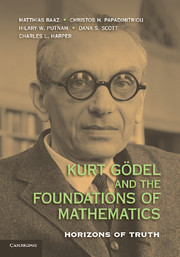Book contents
- Frontmatter
- Contents
- Contributors
- Foreword
- Preface
- Acknowledgments
- Short Biography of Kurt Gödel
- I Historical Context: Gödel's Contributions and Accomplishments
- 1 The Impact of Gödel's Incompleteness Theorems on Mathematics
- 2 Logical Hygiene, Foundations, and Abstractions: Diversity among Aspects and Options
- Gödel's Legacy: A Historical Perspective
- The Past and Future of Computation
- Gödelian Cosmology
- II A Wider Vision: The Interdisciplinary, Philosophical, and Theological Implications of Gödel's Work
- Gödel and the Mathematics of Philosophy
- Gödel and Philosophical Theology
- Gödel and the Human Mind
- III New Frontiers: Beyond Gödel's Work in Mathematics and Symbolic Logic
- The Realm of Set Theory
- Gödel and the Higher Infinite
- Gödel and Computer Science
- Index
1 - The Impact of Gödel's Incompleteness Theorems on Mathematics
Published online by Cambridge University Press: 07 September 2011
- Frontmatter
- Contents
- Contributors
- Foreword
- Preface
- Acknowledgments
- Short Biography of Kurt Gödel
- I Historical Context: Gödel's Contributions and Accomplishments
- 1 The Impact of Gödel's Incompleteness Theorems on Mathematics
- 2 Logical Hygiene, Foundations, and Abstractions: Diversity among Aspects and Options
- Gödel's Legacy: A Historical Perspective
- The Past and Future of Computation
- Gödelian Cosmology
- II A Wider Vision: The Interdisciplinary, Philosophical, and Theological Implications of Gödel's Work
- Gödel and the Mathematics of Philosophy
- Gödel and Philosophical Theology
- Gödel and the Human Mind
- III New Frontiers: Beyond Gödel's Work in Mathematics and Symbolic Logic
- The Realm of Set Theory
- Gödel and the Higher Infinite
- Gödel and Computer Science
- Index
Summary
The Incompleteness Theorems are best known for interpretations put on them beyond – sometimes far beyond – mathematics, as in the Turing Test, or Gödel's belated claims in the Gibbs Lecture, or in Penrose's more recent work. In this chapter, the emphasis is much narrower, in contrast to the title of the 2006 Gödel Centenary Conference in Vienna – “Horizons of Truth: Logics, Foundations of Mathematics, and the Quest for Understanding the Nature of Knowledge” – that preceded the development of this volume. What is discussed here is almost exclusively the impact on pure mathematics.
That the 1931 paper had a broad impact on popular culture is clear. In contrast, the impact on mathematics beyond mathematical logic has been so restricted that it is feasible to survey the areas of mathematics in which ideas coming from Gödel have some relevance. My original purpose in my presentation at the conference was simply to give such a survey, with a view to increasing resistance to the cult of impotence that persists in the literature around Gödel. After the Vienna meeting, Kreisel persuaded me to write an appendix providing some justification for claims I had made concerning formalizing in First-Order Peano Arithmetic (PA) Wiles' proof of Fermat's Last Theorem. Our discussions on this have, in turn, affected Kreisel's (2008) paper, which provides indispensable proof-theoretic background for the appendix.
The Incompleteness Theorems and their proofs are strikingly original mathematics, with something of the charm of Cantor's first work in set theory.
- Type
- Chapter
- Information
- Kurt Gödel and the Foundations of MathematicsHorizons of Truth, pp. 3 - 26Publisher: Cambridge University PressPrint publication year: 2011
- 8
- Cited by



